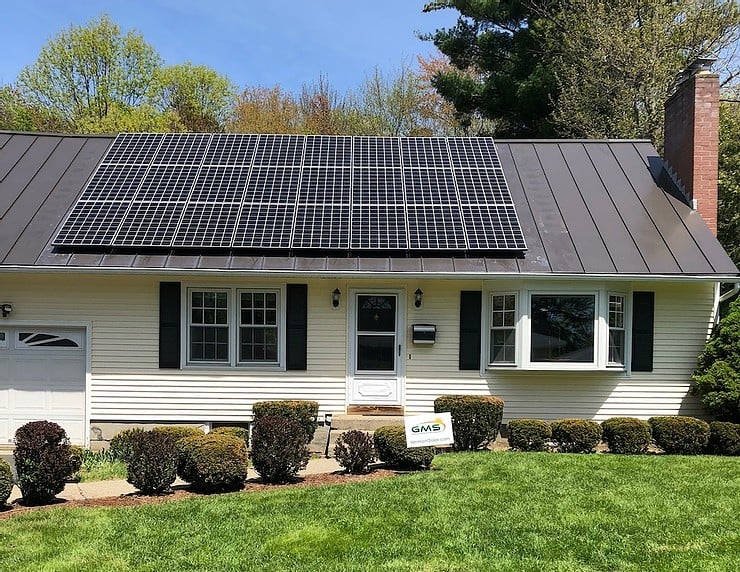Updated: Aug 20, 2020
Solar and batteries may be an investment but it’s more accessible than you may think.

Myth: I need a big paycheck to afford solar. Fact: A Berkeley Lab study found that one-third of solar adopters in 2018 had an annual household income between $50,000 and $100,000. (For reference, the average household income in Vermont is about $60k). And thanks to improved financing options, going solar has never been more in reach.
Green Mountain Solar partners with VSECU, a division of New England Federal Credit Union, a credit union for everyone in Vermont, to take part in their VGreen program, a loan program designed to fund eco-friendly projects. Laurie Fielder, VGreen Program Director, explains how the financing options can work for you.
Solar Power Is an Investment
“And it’s a pretty terrific investment,” Laurie says. In essence, instead of paying your electric bill, you’re paying off the cost of the system. Once that’s bought and paid for, it’s all savings on your electric bill from there.
“You might be looking at a sizeable investment but when you spread that out over a period of time, that makes it more affordable. And during the time that you’re paying down the debt, you also have the benefit of the offset on your electric bill.”
Will My Solar Loan Payment Cost Less than My Current Electric Bill?
The short answer: We try. “Everybody wants their loan to be equal to or less than their electric bill,” acknowledges Laurie. “And we do try in teaming up with Green Mountain Solar to achieve that. But there are a variety of factors that are part of the equation.” This can include the amount of the loan, the term of the loan, and unexpected installation changes. “For instance, you may discover that your property is covered in ledge. That could change things,” she adds.
She explains it like this: Say you currently have a $150 a month electric bill now. When you install solar or add a battery backup, the energy your panels generate (with some help from net metering) help cover the cost of the electricity itself. “Even if you pay $180 for your loan payment, that extra amount got you so that in 12 years you can potentially totally offset your electric bill for the life of the investment which is 25 years since that’s the length of the panel warranty that Green Mountain Solar offers.” (And she also notes that many panels last even beyond this).
“We have a really low default rate on this loan portfolio, mainly because people who invest in clean energy are really committed to the value that they see from it,” Laurie comments. “So, it’s a lot easier to make those payments—even in difficult times—because they’re getting the offset on their electric bill. They directly see the benefit.”
How Does a Solar or Battery Loan Work?
The common solar loan, with or without battery backup through VSECU, a division of New England Federal Credit Union is the ITC (or Investment Tax Credit) loan. “We structure the loan so the borrower really makes the most of the investment,” says Laurie. “The loan term is 144 months, or 12 years, and we structure it so those first 15 payments are as though you had the 26% tax credit upfront. It allows you to make the initial payments at that lower amount.”
*Note, the loan term offered is now 15 years. (Updated 1.9.24)
During these 15 months, you’ll do your taxes and apply the federal tax credit against your tax liability. (This isn’t the same as a tax refund, so check with a tax advisor to know how much you can expect to get back with this credit applied.) “When they receive their investment tax credit funds, they can go and apply that portion to their principal and we’ll reamortize the loan for free.”
When VSECU, a division of New England Federal Credit Union reamortizes a loan, they recalculate the monthly payment based on the new, lower balance after a large payment has been made. “So, the payment stays approximately the same as it was in that initial payment period.”
Didn’t get as much back on your taxes as you expected? “If you don’t have enough tax liability, it doesn’t mean you won’t get it, it just means that it’ll take you longer to fully realize that tax benefit,” she explains. “Which is fine, because, even if it’s not the full amount, you can apply it to the principal of the loan and we’ll reamortize the remaining balance and you will see a lower loan payment in month 16 than you would have seen if you had not done anything.” And solar owners can spread the ITC out over five years if they have to get the full value.
Most importantly, the program is designed to fit the needs of the customer. “Whatever the customer wants us to do, we’ll do,” says Laurie. “There’s no hidden costs or penalties or anything. We don’t charge people to reamortize the loan. If someone chooses to pay off early, that’s fine. I think that flexibility is really key for our partnership with Green Mountain Solar.”
Is there a Minimum Credit Score?
With VSECU, a division of New England Federal Credit Union, while there is no minimum credit score in general, know that in order to receive the Green Mountain Solar partnership pricing, customers need a credit score of at least 680. “Sometimes we have folks that don’t meet that threshold, and they’re still approvable, they would just receive a higher interest rate.”
What Is a Credit Union? How Is a Credit Union Different from a Bank?
“The number one question I hear all the time is that people don’t know what a credit union is,” says Laurie. “They think it’s a bank, and a bank is definitely a different structure than a credit union.” One of the main differences is how the bank uses the money that its clients deposit into its accounts. Unlike with a bank, members are owners of the institution, so they have a say in where this money gets used.
VSECU, a division of New England Federal Credit Union is a values-based financial cooperative open to everyone who lives or works in Vermont. “Each person is a voting member of a financial cooperative. It’s just like a food co-op—it’s one member, one vote,” she explains. For VSECU, a division of New England Federal Credit Union, its members have decided to support the environmentally focused loan program called VGreen.
The main thing that this means for your solar loan is: If you have two people on the loan, you each need to become members, even if the account is a joint one. To become a member, all you need is to open a share account—so named because it’s your “share” of the co-op—with a $25 minimum deposit.
“The value in credit union membership is that they have a say in what happens,” says Laurie. It’s really a unique way to vote with your dollar. “The deposits in that share account are used to grow this loan program and it really helps to invest in a different way in what people value—things like developing and promoting clean energy in the region.” And when matched up with a local solar company, this is the perfect partnership to help express the power of people to invest in the future of renewable resources and their local economy.
The only other requirement is to be a member of the Northeast Sustainable Energy Association (NESEA). This membership comes at no cost to the customer (compliments of VSECU).
By Julia Westbrook

Leave a Comment